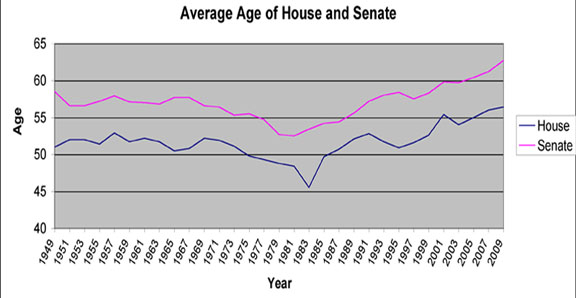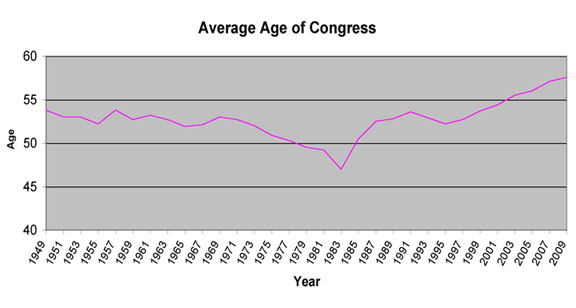
Lots of upbeat, buoyant, exceedingly sanguine-type folks have been proclaiming that the November 4th election constituted nothing less than a generational watershed in our nation's history, ushering in a post-boomer epoch of youthful governance. After all, we elected the whippersnapper 47 year old instead of the creaky, cranky, crotchety 72 year old. Young voters favored Obama by a 2-1 margin. An estimated 23 million young voters overall cast ballots, amounting to 18% of the total tally. Those 18-29 year old voters turned out at the highest rate (est. 52-53%) since 1972 (55.4%), the year when the 26th Amendment went into effect.
This new era of young, hip voters has already been branded as Generation O. New energy. New ideas. A new youth movement. Social networking. Technological savvy. Civic engagement. The times they are a-changin'. The future is bright. Green with greenhorns. Optimism. Hope springs eternal. A fresh start. Youth shall be served. All of that.
Not so fast.
Did the tidal wave of young voters actually elect into office a fresh-face cohort of younger federal representatives, beyond Barack, who might better understand, and more closely relate to, and more directly represent their generational interests? Let's look carefully at the ages of our new congressional representatives.
(Spoiler Alert: We elected a bunch of OLD GUYS into office. Really old guys. The oldest guys ever, in fact.)
The 111th Congress, when it convenes on January 6th, will be the oldest in our nation's history. Each of the last five Congresses has, successively, set a new record as the oldest our country has ever seen. Our elected federal representatives keep getting, as a collective body, more and more elderly. Maybe we should be calling our government what it has literally become: a veritable gerontocracy. (Critics have also called it a plutocracy, a patriarchy, and a white-ocracy; yet the dominating effects of class, gender, and race have been, in recent years, recognized and mitigated just a bit, whereas the tendencies toward seniority keep trending upwards, and unwittingly so.)
Here are the facts: The average age of both houses combined in the 111th Congress will be 57.6 years old--that's an all-time high, beating the 110th Congress's record of 57 years old. [Note that there are still five House races undecided and three unresolved Senate races; but those outcomes will not reduce the average ages below record-setting levels.]
The Senate will be the oldest ever. The average age will be 62.7 years old. The former record, set by the 110th Congress, was 62 years old.
Robert C. Byrd will be 91 years old. The Senate will have 3 octogenarians (add one more if Ted Stevens prevails in Alaska), 18 septuagenarians, and 36 sexagenarians (37 if Saxby Chambliss prevails in Georgia). Hence a strong majority--60% of the Senate--will be 60 years old and above.
The youngest senator, Mark Pryor of Arkansas, will be 45 years old--and he'll turn 46 on January 10, 2009.
(I wonder: Did the not-yet-jaded 18-29 year olds fully realize, as they were voting, that there would be absolutely no senator under 46 years old? Back in the day, Joe Biden ran for and was elected to the Senate as a 29 year old, knowing he would turn 30 before the swearing in ceremony.)
The House will also be the oldest ever. The average age will be 56.4 years old, beating the 110th's record average of 56 years old. There will be 3 octogenarians, 40 septuagenarians, and 171 members altogether age 60 years and above.
The youngest member, Aaron Schock of Illinois, is 27 years old--the one and only under-30 member in several sessions. Think about it: If a particular policy issue divides along generational lines (e.g., Social Security), Rep. Schock might find himself as the sole age-appropriate spokesperson for those 23 million 18-29 year old voters (not to mention the 44 million 18-29 year olds overall).


What does this mean? As I speculated two years ago on Huffpo: Surely a number of factors contribute to the graying of Congress: the graying of the voting public overall (life expectancy in the U.S., btw, has doubled since the founders designed the Constitution); the ever-increasing need for campaign money; the increased advantages of incumbency. Yet these numbers and trends should also raise obvious questions about whether such an elderly body can claim to be adequately representing--both procedurally and substantively--the interests of younger American citizens.
Maybe it's time to review the U.S. Constitution's age requirements for candidacy (25 for the House, 30 for the Senate, 35 for the Presidency), because changed demographics and changed practices have rendered them antique. Most democracies the world over set the age of candidacy to coincide with the age of majority. The U.S. is one of the clear outliers. Last year Britain, for instance, lowered its age of office eligibility for Parliament from 21 to 18. Why are we such laggards?
If our youngish new Prez wants to deliver on his promises in particular to those 18-29 year olds who voted for him in such overwhelming numbers, Obama will have to convince a large bloc of oldsters in Congress that they ought to legislate in favor of a group whose generational interests and purview the oldsters may no longer share, or appreciate, or even understand. It may be an uphill battle: All of the senators, but one, will be older than Obama himself!
If Obama and the new Congress end up dashing the elevated hopes of those newly energized young voters, what then? Will they begin to suspect that they were suckered into voting for a bunch of graybeards? When will it dawn on them that the system is constitutionally rigged against them: The 18-24 year olds among them cannot run for any elected federal office, nor can they vote for a candidate from their own age cohort; and none of them can vie for the Senate. When will our younger adult-age citizens start claiming for themselves the same level of political freedom, of civic standing and codified equality, that most of their democratic compatriots the world over already enjoy? When will they realize that they have been officially designated as second-class citizens under the explicit terms of the U.S. Constitution? When will they come to regard the condition of generational guardianship, under which they now operate, as anathema to the ever-unfolding American project of insisting upon direct, as opposed to virtual, representation in our legislative halls? Why are their elders so fearful of young talent and young competition entering into the political arena?
I suspect that reactions to this post may correlate significantly to age. Do tell.
Full disclosure: I've written a book exploring the problems of our constitutional age requirements and, in turn, proposing that we need an AGE Amendment to the U.S. Constitution that would lower the age of eligibility for elected federal office (AGE = All Grown-ups Eligible). The book will be forthcoming eventually (currently in production), to be published by the Penn State University Press. Please send me your ideas and feedback.